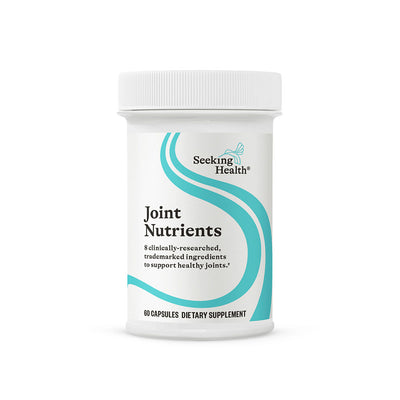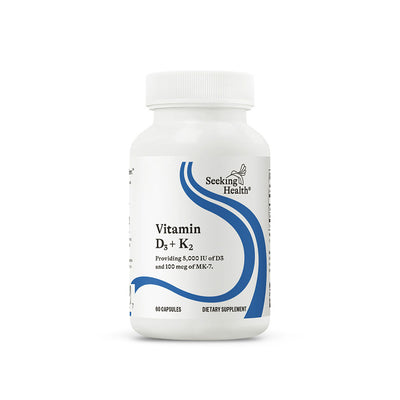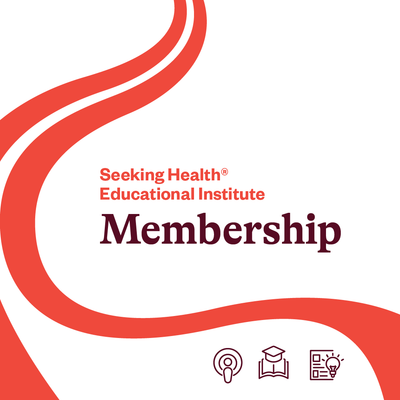It is widely known that calcium is required for strong bones. But there are other essential nutrients that support bone health. Just like you wouldn’t work out one muscle to support your whole body’s strength, it’s important to consider the full spectrum of nutrients for skeletal health.
In this article, we’ll explore basic factors to understand about keeping your bones strong, like foods, nutrients, lifestyle changes, and dietary supplements.†
What Affects Bone Health?

Many things impact how healthy a person’s bones are. While you cannot control some of them, you can have a significant impact on others.
Genetics
Your genes can influence many factors relating to bone health. If you have family history of brittle bones, you have a higher risk of developing the same problem. (1)
Hormone changes can dramatically influence how the body builds, breaks down, and rebuilds bones. The estrogen drop associated with perimenopause, menopause, and post-menopause has a strong association with reduced bone mass. However, even people without menopausal hormone changes, like younger women and men, can still experience low bone density. Men who have prostate conditions and take medications to lower testosterone levels may be at risk for accelerated bone loss. (2)
Diet & Nutrition
The food that you eat plays a major role in healthy bone stores. Calcium is a well-known nutrient that is necessary for building bones, but many other aspects of a healthy diet and digestion affect postmenopausal women and people of all ages.†
Even if you eat a healthy diet, if digestion is not functioning optimally, your body may not be able to break down your food. This may decrease your ability to absorb and use all of those necessary vitamins and minerals. Gastrointestinal conditions represent major risk factors for bone health problems. (3)
Aging
Plenty of research indicates that bone health peaks before age 30. (4) As a person’s age increases, it is harder to replace bone at the same rate that it is lost. This is partially due to age-related factors in both men and women that naturally decrease calcium absorption in the gut, as well as a general overall gradual decline in bone density and nutrient absorption. 5,6)
6 Important Nutrients for Bone Health

While calcium is the most abundant mineral in the body, it is not the only one that is vital for healthy bones.†(5)
The following nutrients all play a crucial role in supporting healthy bone density and skeletal strength.
Calcium
While calcium gets frequent mention when it comes to bone health, without the support of other minerals, calcium alone is not enough to maintain a healthy skeleton. Still, you need adequate intake of calcium.† Calcium deficiency is linked to: (7,8)
- Reduce bone strength
- Fragile bones that may break easily
- Weaker bone tissues and surrounding structures
- Increased risk of falling
The National Institutes of Health (NIH) notes that the Recommended Dietary Allowance (RDA) for calcium in adults ranges between 1,000-1,200 mg per day, depending on age. (5)
Even for people who follow a dairy-free diet, it is possible to obtain most calcium from foods. While calcium is necessary for healthy bones,† over-supplementing can have risks of its own, such as: (5)
- Poor muscle tone
- Kidney issues
- Constipation
- Nausea
- Weight loss
- Fatigue
- Heart rhythm issues and other cardiovascular problems
- Prostate problems
Vitamin D3
Vitamin D3 is a fat-soluble nutrient that has hormone-like properties. It works closely with calcium to support bone health and many other aspects of wellness. Vitamin D3 specifically plays an important role in helping the body utilize dietary calcium by supporting improved absorption. Without enough vitamin D, the body may pull more calcium from bone stores.† (9)
Vitamin D deficiency occurs in around 6 percent of adults in the U.S., while suboptimal levels may be present in almost 25 percent of the population. (10)
It’s challenging to get enough vitamin D from food alone. Vitamin D supplements represent an evidence-based way to support healthy levels, but there is no standardized level for everyone. Healthcare providers usually recommend vitamin D supplements based on blood testing and other health factors.† (11)
Magnesium
Magnesium is an important mineral for more than 300 enzyme reactions in the body. It also supports bone mineral density, with around 50-60 percent of the body’s magnesium stores being held in the bones.† (12)
Yet as many as 48 percent of adults do not consume enough magnesium on a regular basis, which can impact overall bone health and lead to an increased risk of bone fractures. (12,13)
Potassium
Potassium is a mineral that functions as an electrolyte. It also supports calcium metabolism and reduces calcium losses in the body. (14) When potassium intake is low, it can lead to increased bone turnover, which can worsen density problems.† (15)
Boron
A trace mineral that is only needed in tiny amounts, boron is required for proper bone growth and maintaining healthy bone mineral density. (16) Boron also supports the function of vitamin D in the body.† (17)
Vitamin K2
Vitamin K2 is a fat-soluble nutrient that is differentiated in function from vitamin K1. Vitamin K2 is also known as menaquinones, and the three most common are MK-4, MK-7, and MK-9. (18)
Research has tied adequate levels of Vitamin K2 to healthy bone-building processes. (19) Many bone health supplements now include vitamin K2 along with other bone-friendly nutrients like vitamin D. However, if you take medications to thin the blood or have a history of blood clots, a healthcare provider needs to determine whether you can supplement with vitamin K, since it also impacts coagulation.† (18)

Best Foods for Bone Strength
With so many nutrients that impact bone health, your dietary intake can play a major role in maintaining optimal skeletal health. While everyone has unique factors that influence foods that work for them, the following foods are considered to be supportive of good bone strength.
You can also support bone health by eating foods that support overall digestive function. Fiber is necessary not only for helping promote normal digestive transit time, but can also nourish the beneficial bacteria in the gut microbiome.
Foods that you don’t eat can also protect bone health. If you want to support healthy bone density, limit or avoid the following: (20,21)
- Alcohol
- Caffeine
- Black tea
- Soft drinks
Foods that cause digestive problems or worsen existing health conditions may also have a direct or indirect effect on healthy bone density.
Lifestyle Support for Strong Bones

Lifestyle choices can also have a direct role in promoting healthy bones: (22,23,24,25)
- Avoid tobacco use and cigarette smoking
- Get regular physical activity, such as walking or other light aerobic activities
- Incorporate some weight-bearing exercises that utilize resistance
- Practice stretching, flexibility, and balance training like yoga or Tai Chi
- Maintain a healthy body weight for you
Best Supplements for Bone Health†
Even with a healthy diet and lifestyle, some people can benefit from supplements that support bone health. But supplements alone will not compensate for inadequate dietary intake or lifestyle factors.†
Bone health supplements can include:†
The Bottom Line
Bone health is important at all stages of life. Having strong bones is something people may take for granted because symptoms don't usually appear until bone loss is advanced. Dietary and lifestyle support are both essential in supporting bone health at any age or stage of life.
References
- https://www.ncbi.nlm.nih.gov/pmc/articles/PMC9206152/
- https://www.ncbi.nlm.nih.gov/pmc/articles/PMC3970273/
- https://www.ncbi.nlm.nih.gov/pmc/articles/PMC2950667/
- https://www.ncbi.nlm.nih.gov/pmc/articles/PMC4402109/
- https://ods.od.nih.gov/factsheets/Calcium-HealthProfessional/
- https://www.ncbi.nlm.nih.gov/pmc/articles/PMC3383520/
- https://pubmed.ncbi.nlm.nih.gov/21796828/
- https://www.ncbi.nlm.nih.gov/pmc/articles/PMC8318176/
- https://www.bones.nih.gov/health-info/bone/bone-health/nutrition/ calcium-and-vitamin-d-important-every-age
- https://www.ncbi.nlm.nih.gov/pmc/articles/PMC7091696/
- https://ods.od.nih.gov/factsheets/VitaminD-HealthProfessional/
- https://ods.od.nih.gov/factsheets/Magnesium-HealthProfessional/
- https://www.ncbi.nlm.nih.gov/pmc/articles/PMC3775240/
- https://pubmed.ncbi.nlm.nih.gov/28093633/
- https://ods.od.nih.gov/factsheets/Potassium-HealthProfessional/
- https://pubmed.ncbi.nlm.nih.gov/32540741/
- https://ods.od.nih.gov/factsheets/Boron-HealthProfessional/
- https://ods.od.nih.gov/factsheets/VitaminK-HealthProfessional/
- https://pubmed.ncbi.nlm.nih.gov/15771560/
- https://ijbnpa.biomedcentral.com/articles/10.1186/s12966-020-01040-4
- https://www.ncbi.nlm.nih.gov/pmc/articles/PMC5684300/
- https://pubmed.ncbi.nlm.nih.gov/26332401/
- https://pubmed.ncbi.nlm.nih.gov/26588353/












